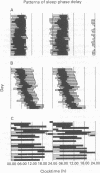Abstract
Fourteen subjects are described in whom a clinical diagnosis of the delayed sleep phase syndrome was made. The condition is multi-factorial, dependent on lifestyle, mood and personality, as well as on familial factors but no single factor in isolation is sufficient to explain the delay in sleep timing. Refusal to attend school may be important in some instances but will not explain cases with delayed age of onset. In half the subjects the delay in sleep phase started in childhood or adolescence. The syndrome causes severe disruption to education, work and family life. Polysomnography, motor activity monitoring of rest-activity cycles, plasma melatonin profiles and urinary melatonin metabolite excretion are normal. Different patterns of sleep phase delay seen in the syndrome include stable, progressive, irregular and non-24 hour sleep-wake cycles. These patterns may result from different social and other Zeitgebers ("time-markers", for example sunrise, sunset) in the normal environment. Treatment by forced sleep-wake phase advance or with melatonin resulted in a partial sleep-phase advance but this was not maintained on stopping treatment.
Full text
PDF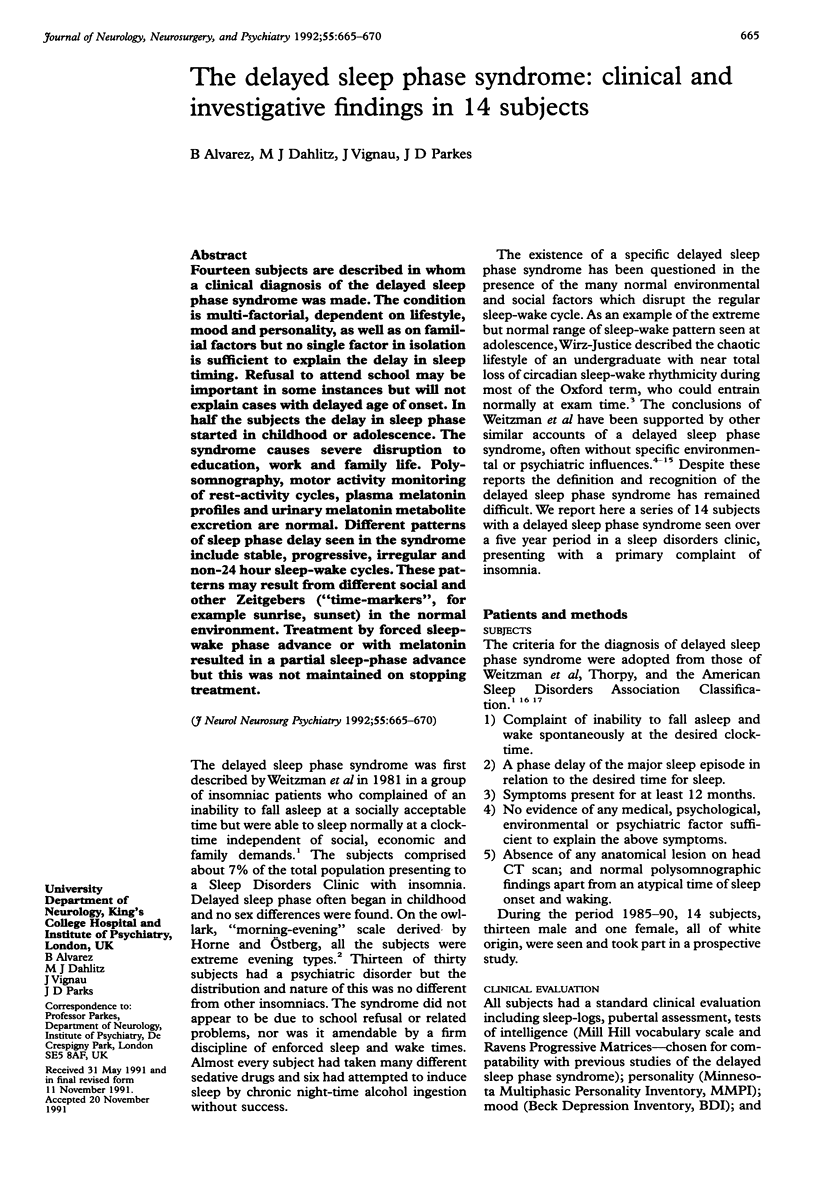
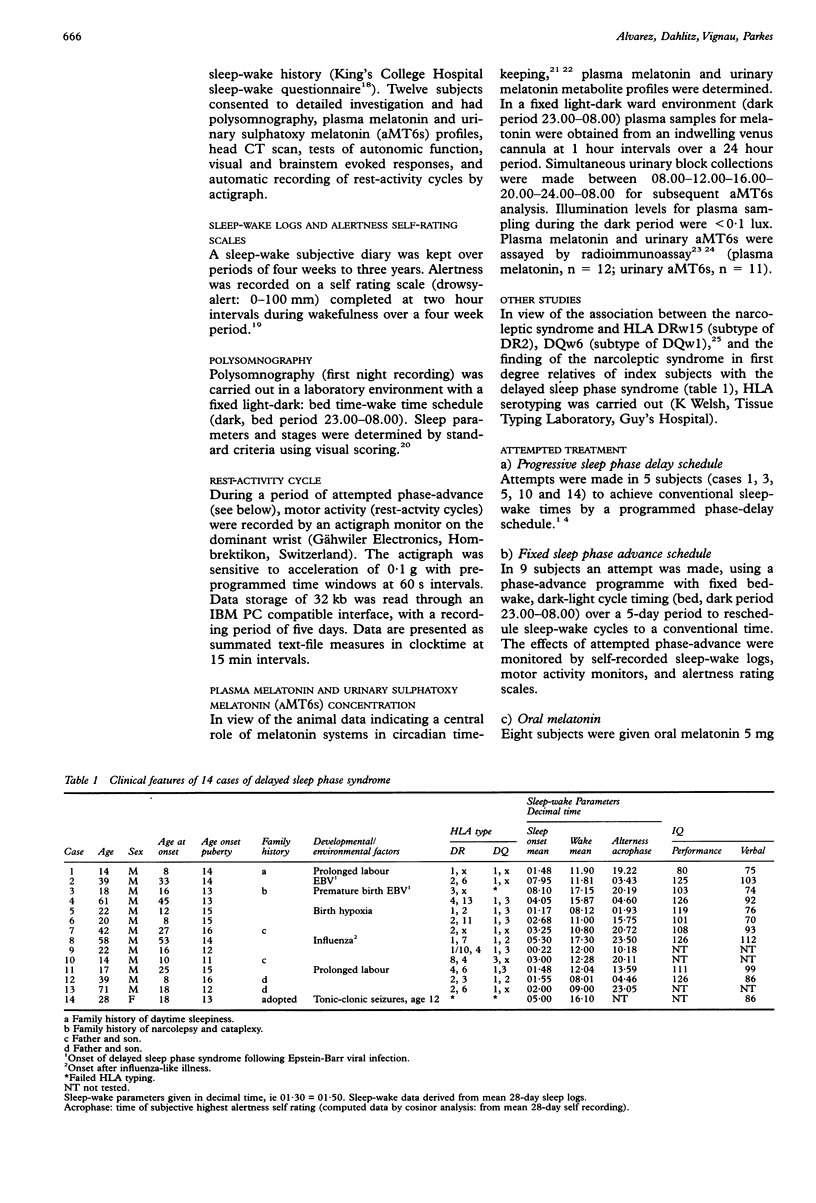
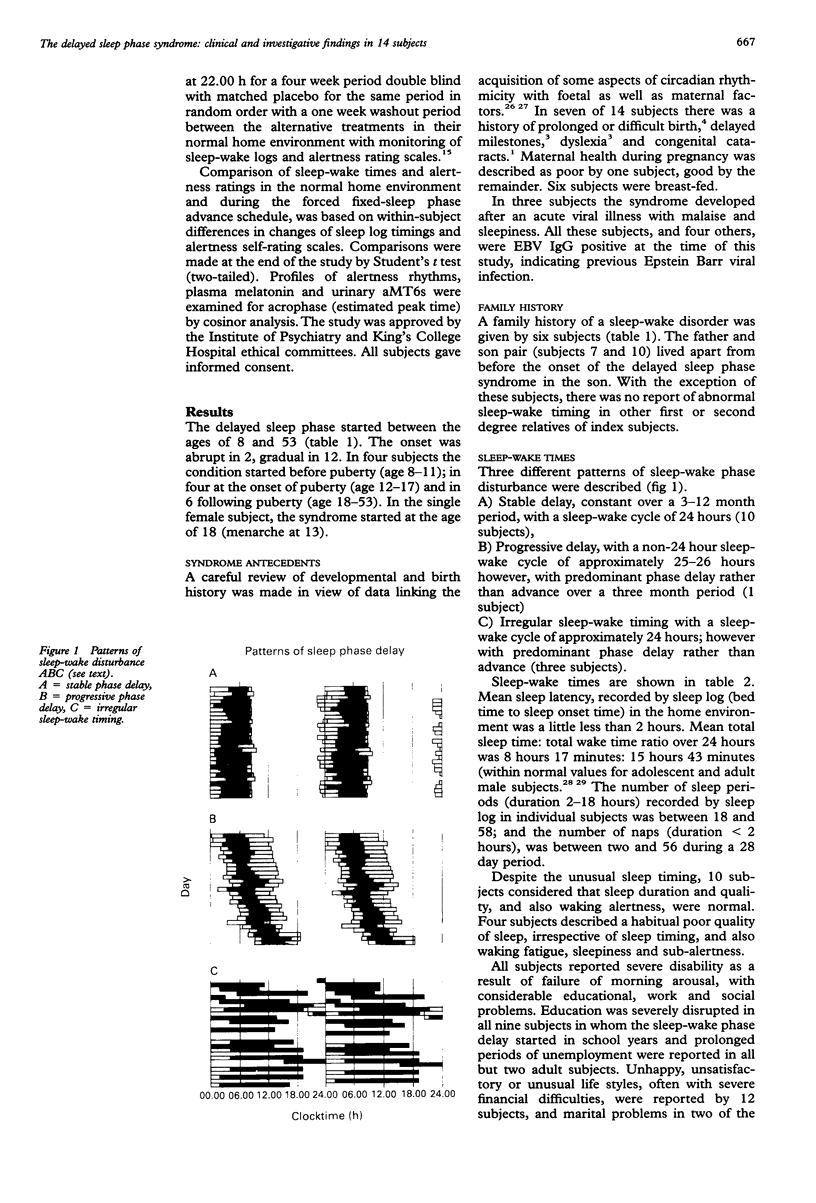
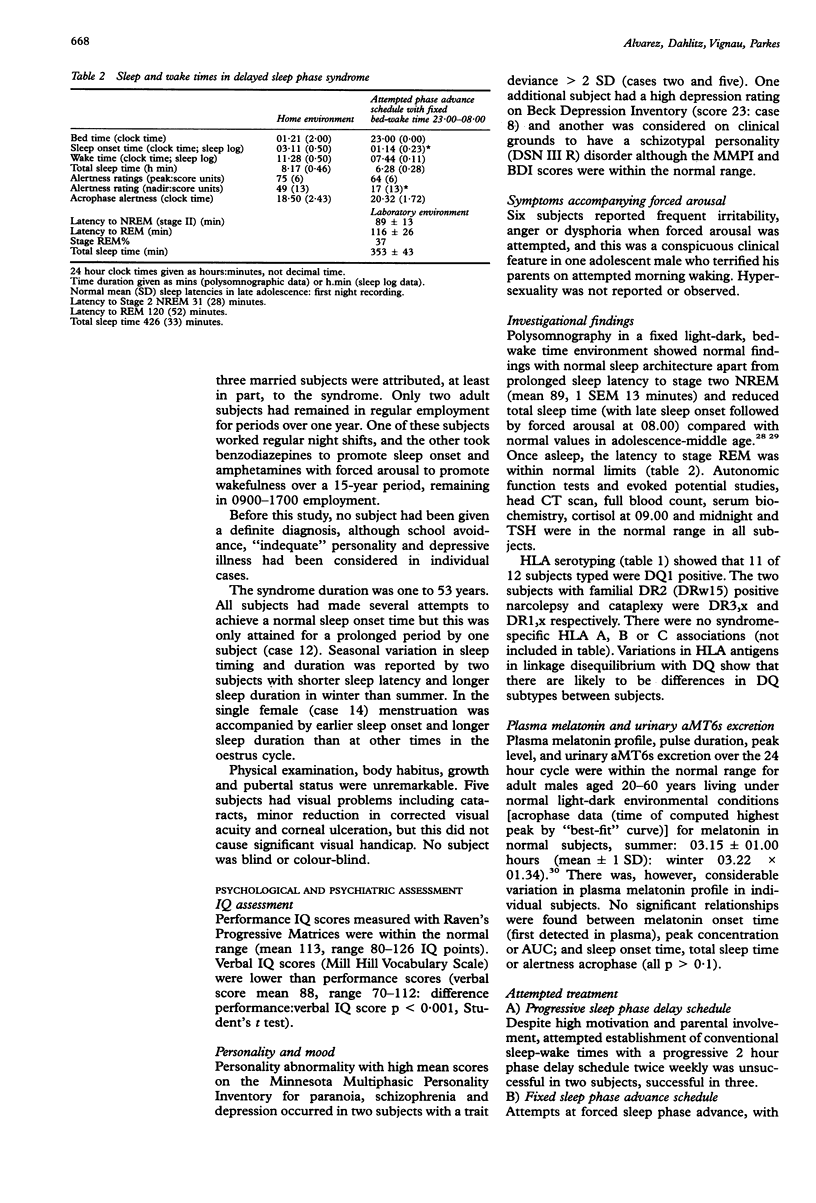
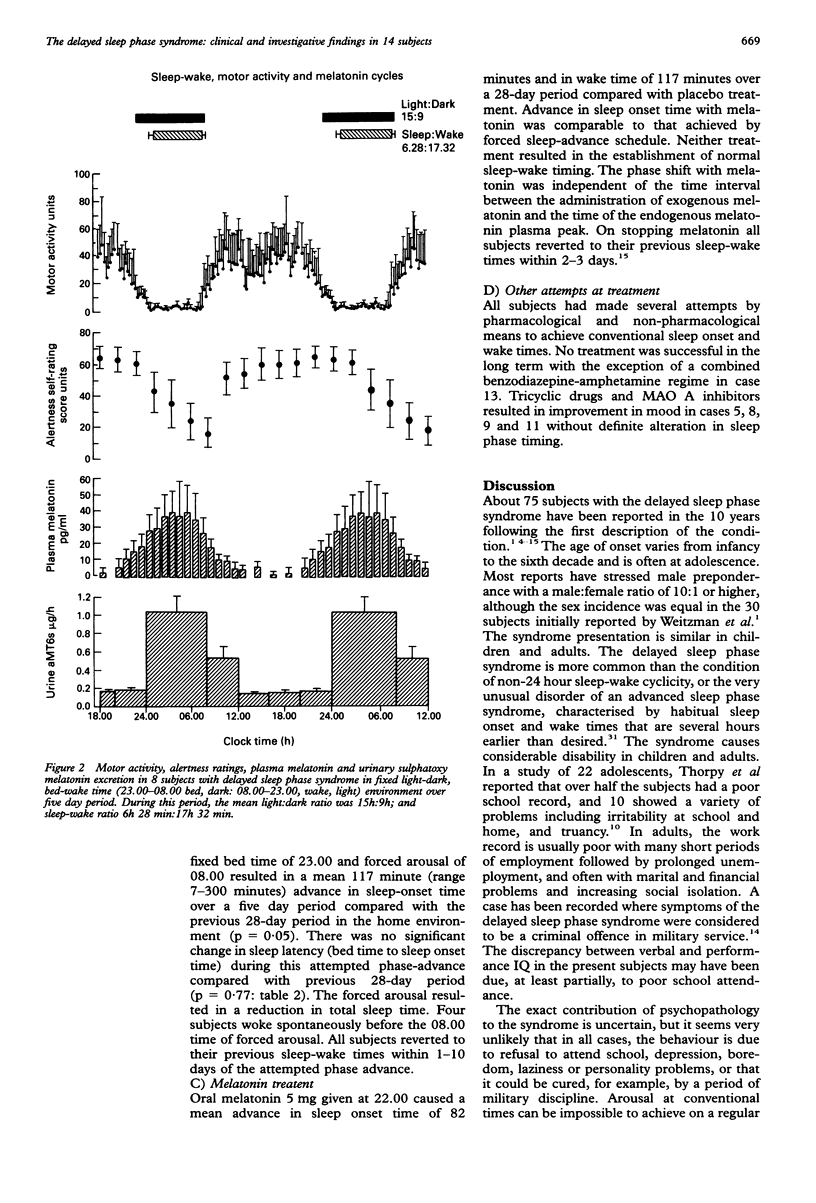
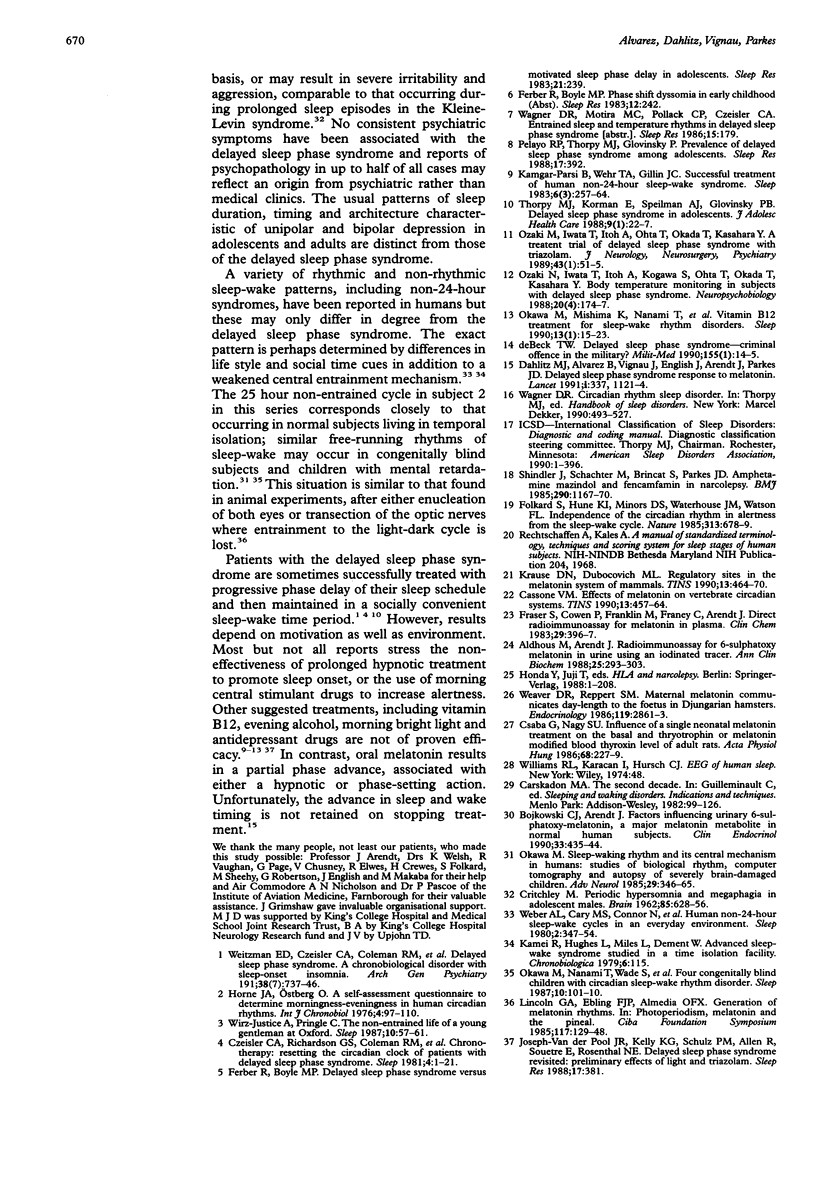
Images in this article
Selected References
These references are in PubMed. This may not be the complete list of references from this article.
- Aldhous M. E., Arendt J. Radioimmunoassay for 6-sulphatoxymelatonin in urine using an iodinated tracer. Ann Clin Biochem. 1988 May;25(Pt 3):298–303. doi: 10.1177/000456328802500319. [DOI] [PubMed] [Google Scholar]
- Bojkowski C. J., Arendt J. Factors influencing urinary 6-sulphatoxymelatonin, a major melatonin metabolite, in normal human subjects. Clin Endocrinol (Oxf) 1990 Oct;33(4):435–444. doi: 10.1111/j.1365-2265.1990.tb03882.x. [DOI] [PubMed] [Google Scholar]
- Cassone V. M. Effects of melatonin on vertebrate circadian systems. Trends Neurosci. 1990 Nov;13(11):457–464. doi: 10.1016/0166-2236(90)90099-v. [DOI] [PubMed] [Google Scholar]
- Csaba G., Nagy S. U. Influence of a single neonatal melatonin treatment on the basal and thyrotropin or melatonin modified blood thyroxine level of adult rats. Acta Physiol Hung. 1986;68(2):227–229. [PubMed] [Google Scholar]
- Czeisler C. A., Richardson G. S., Coleman R. M., Zimmerman J. C., Moore-Ede M. C., Dement W. C., Weitzman E. D. Chronotherapy: resetting the circadian clocks of patients with delayed sleep phase insomnia. Sleep. 1981;4(1):1–21. doi: 10.1093/sleep/4.1.1. [DOI] [PubMed] [Google Scholar]
- Folkard S., Hume K. I., Minors D. S., Waterhouse J. M., Watson F. L. Independence of the circadian rhythm in alertness from the sleep/wake cycle. Nature. 1985 Feb 21;313(6004):678–679. doi: 10.1038/313678a0. [DOI] [PubMed] [Google Scholar]
- Fraser S., Cowen P., Franklin M., Franey C., Arendt J. Direct radioimmunoassay for melatonin in plasma. Clin Chem. 1983 Feb;29(2):396–397. [PubMed] [Google Scholar]
- Kamgar-Parsi B., Wehr T. A., Gillin J. C. Successful treatment of human non-24-hour sleep-wake syndrome. Sleep. 1983;6(3):257–264. doi: 10.1093/sleep/6.3.257. [DOI] [PubMed] [Google Scholar]
- Krause D. N., Dubocovich M. L. Regulatory sites in the melatonin system of mammals. Trends Neurosci. 1990 Nov;13(11):464–470. doi: 10.1016/0166-2236(90)90100-o. [DOI] [PubMed] [Google Scholar]
- Lincoln G. A., Ebling F. J., Almeida O. F. Generation of melatonin rhythms. Ciba Found Symp. 1985;117:129–148. doi: 10.1002/9780470720981.ch9. [DOI] [PubMed] [Google Scholar]
- Okawa M., Mishima K., Nanami T., Shimizu T., Iijima S., Hishikawa Y., Takahashi K. Vitamin B12 treatment for sleep-wake rhythm disorders. Sleep. 1990 Feb;13(1):15–23. doi: 10.1093/sleep/13.1.15. [DOI] [PubMed] [Google Scholar]
- Okawa M., Nanami T., Wada S., Shimizu T., Hishikawa Y., Sasaki H., Nagamine H., Takahashi K. Four congenitally blind children with circadian sleep-wake rhythm disorder. Sleep. 1987 Apr;10(2):101–110. doi: 10.1093/sleep/10.2.101. [DOI] [PubMed] [Google Scholar]
- Ozaki N., Iwata T., Itoh A., Kogawa S., Ohta T., Okada T., Kasahara Y. Body temperature monitoring in subjects with delayed sleep phase syndrome. Neuropsychobiology. 1988;20(4):174–177. doi: 10.1159/000118495. [DOI] [PubMed] [Google Scholar]
- Paton A. The politics of alcohol. Br Med J (Clin Res Ed) 1985 Jan 5;290(6461):1–2. doi: 10.1136/bmj.290.6461.1. [DOI] [PMC free article] [PubMed] [Google Scholar]
- Thorpy M. J., Korman E., Spielman A. J., Glovinsky P. B. Delayed sleep phase syndrome in adolescents. J Adolesc Health Care. 1988 Jan;9(1):22–27. doi: 10.1016/0197-0070(88)90014-9. [DOI] [PubMed] [Google Scholar]
- Weaver D. R., Reppert S. M. Maternal melatonin communicates daylength to the fetus in Djungarian hamsters. Endocrinology. 1986 Dec;119(6):2861–2863. doi: 10.1210/endo-119-6-2861. [DOI] [PubMed] [Google Scholar]
- Weber A. L., Cary M. S., Connor N., Keyes P. Human non-24-hour sleep-wake cycles in an everyday environment. Sleep. 1980;2(3):347–354. [PubMed] [Google Scholar]
- Wirz-Justice A., Pringle C. The non-entrained life of a young gentleman at Oxford. Sleep. 1987 Feb;10(1):57–61. doi: 10.1093/sleep/10.1.57. [DOI] [PubMed] [Google Scholar]
- deBeck T. W. Delayed sleep phase syndrome--criminal offense in the military? Mil Med. 1990 Jan;155(1):14–15. [PubMed] [Google Scholar]




